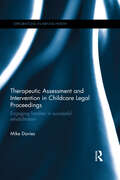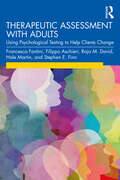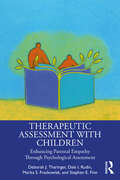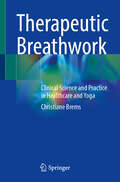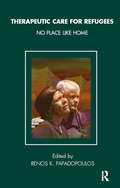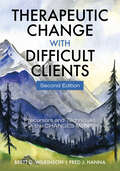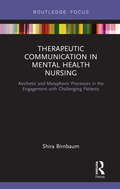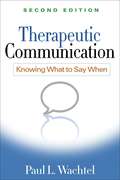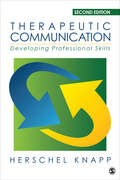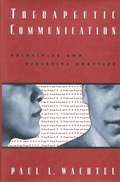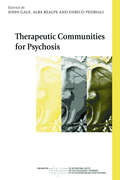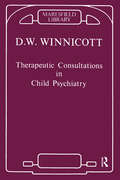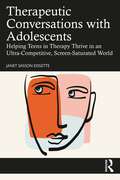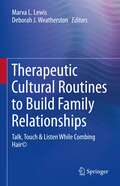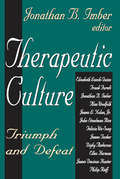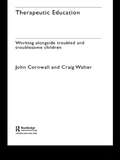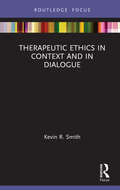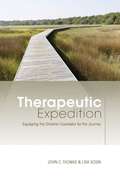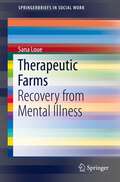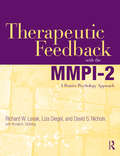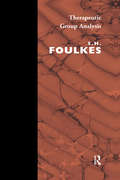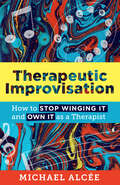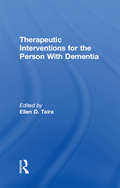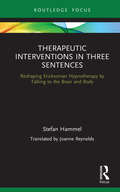- Table View
- List View
Therapeutic Assessment and Intervention in Childcare Legal Proceedings: Engaging families in successful rehabilitation (Explorations in Mental Health)
by Mike DaviesThis book draws upon the author’s first-hand clinical experience as an Expert Witness in child and family legal proceedings to explore the success of psychotherapy assessments and interventions. Focusing on families who are seeking to be re-united after the removal of their children into foster care, Mike Davies discusses critical aspects of therapy which can help to identify and engage those who will benefit from additional support. Chapters combine heuristic, case studies, and narrative research methodologies, considering parents’ stories, self-identity issues and assessment criteria, to uncover an emerging framework that illuminates an innovative therapeutic approach. Divided into three parts, the book develops a comprehensive overview of and thorough investigation into therapeutic assessment during childcare legal proceedings, including explorations into crucial issues such as how and why some families are granted therapeutic intervention, as well as the level of understanding and expertise that professionals and local services can provide in these contexts.Therapeutic Assessment and Intervention in Childcare Legal Proceedings will be of key reading for researchers, academics and postgraduate students in the fields of child and adolescent mental health, law, social work and psychotherapy. The book will also be of interest to social workers, expert psychologists, psychotherapists, family therapists, psychiatrists, and those specialising in public law.
Therapeutic Assessment with Adults: Using Psychological Testing to Help Clients Change
by Stephen E. Finn Francesca Fantini Filippo Aschieri Raja M. David Hale MartinThis book is a comprehensive guide to Therapeutic Assessment (TA) with adults, showing how to collaboratively engage clients in psychological testing to help them achieve major and long-lasting change. This guide clearly lays out each step of TA with adults, including its rationale and detailed instructions on how to handle a range of clinical situations. Additionally, in part one, the authors fully describe the development of TA, its theoretical bases, and the most up-to-date research on the model. In the second part of the book, the authors describe the structure and techniques of TA, and illustrate each step with transcripts from a clinical case. Further clinical illustrations help the reader understand how to conduct a TA with different types of clients, including those from culturally diverse backgrounds. This book is essential for all clinicians, therapists and trainees working with adult clients; along with students in assessment courses.
Therapeutic Assessment with Children: Enhancing Parental Empathy Through Psychological Assessment
by Stephen E. Finn Deborah J Tharinger Dale I Rudin Marita FrackowiakTherapeutic Assessment with Children presents a ground-breaking paradigm of psychological assessment in which children and families collaborate with the psychologist assessor to understand persistent problems and find new ways of repairing their relationships and moving forward with their lives. This paradigm is systemic, client-centered, and culturally sensitive and is applicable to families from many different backgrounds who often feel misunderstood and disempowered by traditional assessment methods. In this book, the reader will find a step-by-step description of Therapeutic Assessment with Children (TA-C), with ample teaching examples to make each step come alive. Each chapter includes detailed transcripts of assessment sessions with Henry, a ten-year-old boy, and his parents as they progress through a Therapeutic Assessment and find new ways of appreciating each other and being together. The combination of didactic and clinical material will give even new clinicians a groundwork from which to begin to practice TA-C. The volume demonstrates how the core values of TA-C—collaboration, respect, humility, compassion, openness, and curiosity—can be embedded in psychological assessment with children and families. Therapeutic Assessment with Children will be invaluable for graduate assessment courses in clinical, counseling, and school psychology and for seasoned professionals wanting to learn the TA-C model.
Therapeutic Breathwork: Clinical Science and Practice in Healthcare and Yoga
by Christiane BremsTherapeutic breathwork has become an important component of many healthcare and psychotherapeutic interventions, as well as being an essential aspect of yoga practices based in ancient wisdom traditions. Despite growing popularity of integrating breathing practices into healthcare and yoga therapeutics, many healthcare providers and yoga professionals lack depth of knowledge about the biomechanics, biochemistry, and psychophysiology of breathing. This dearth of wisdom can result in breathing practices based on prevailing myths and misconceptions about breath and breathing, and often leads to one-size-fits-all approaches to breathwork that can be detrimental for particular clients or contexts. Therapeutic Breathwork: Clinical Science and Practice in Healthcare and Yoga offers a different approach: it translates respiratory science and ancient wisdom into practical guidance for therapeutic breathwork that is individually tailored and person-centered. This book encourages a four-part process of understanding the challenges of the person being served, carefully assessing context and root causes of presented challenges, co-creating clear goals and optimistic motivation, and offering breath, breathing, and breathwork practices that are optimally designed based on this understanding of each breather’s context and personhood. The text familiarizes healthcare providers and yoga professionals who use therapeutic breathwork in their clinical practice with the science, psychology, and yoga-based pedagogy of breath and breathing. It discusses modern respiratory science in great depth, inviting learners to apply these principles practically and flexibly to create accessible, tailored, and person-centered therapeutic breathwork practices. Practical considerations are outlined for a variety of breathing practices and discussed to optimize accessibility and tailoring across the diverse patient and student populations represented in healthcare, yoga settings, and other therapeutic contexts. It offers providers clear instructions, person-centered guidelines, suggestions for cuing, sample intervention scripts, and guidance for adapting and tailoring breathwork to the bioindividuality and diversity of clients, patients, and yoga students. Therapeutic Breathwork: Clinical Science and Practice in Healthcare and Yoga advocates for an interactive, reciprocal, and compassionate relationship between provider and client in the therapy or medical office and yoga classroom. It serves as a guide to breathwork and breathing practices for healthcare providers, yoga professionals, and advanced yoga practitioners who want to use breathwork to enhance personal and collective health and resilience, in the contexts of healthcare, self-care, and therapeutic yoga.
Therapeutic Care for Refugees: No Place Like Home (Tavistock Clinic Series)
by Renos K. PapadopoulosThis volume addresses the complexities involved in attending to the mental health of refugees. It covers theory and research as well as clinical and field applications, emphasising the psychotherapeutic perspective. It explores the delicate balance between accepting the resilience of refugees whilst not neglecting their psychological needs, within a framework that avoids pathologising their condition. Moreover, it deals with the difficulties in delineating the various relevant intersecting perspectives to the refugee reality, e.g. psychological, socio-political, legal, organisational and ethical. The book introduces important considerations about the actual psychotherapy with refugees (in individual, family and group settings) but in addition, it encourages the introduction of therapeutic elements to all types of work with refugees. Thus, it argues for the necessity of approaching every facet of the refugee experience from a therapeutic perspective; this is why the title refers to therapeutic care rather than to psychotherapy.
Therapeutic Change With Difficult Clients: Precursors and Techniques in the CHANGES Model
by Brett D Wilkinson Fred J. HannaNow in its second edition, Therapeutic Change with Difficult Clients describes a common factors model for understanding and activating the process of change with challenging clients. For therapists, the most difficult clients to treat are often those who have little interest in change. Whether they believe that change is a waste of time, or a threat to their personal freedom or sense of being, the difficulty of treating such clients reveals the limits of typical approaches to psychotherapy. A thorough understanding of the true nature therapeutic change is often the most important step toward improving psychotherapy effectiveness. The CHANGES model, which has been significantly expanded and updated since the first edition of this book, is founded on the seven precursors of change, which are identified, assessed, and activated in the context of therapeutic encounters. The authors examine the capacities of individuals to generate therapeutic change, identify the barriers to change, and discuss the power of therapists to catalyze the change process using a variety of well established techniques. In addition to updated supporting literature, the authors discuss recent advances in neuroscience and the cognitive sciences, as well as new developments in the interpersonal aspects of therapeutic engagement.
Therapeutic Communication in Mental Health Nursing: Aesthetic and Metaphoric Processes in the Engagement with Challenging Patients
by Shira BirnbaumThis book introduces an innovative technique for therapeutic communication in mental health nursing, expanding the toolkit for nurses seeking to engage challenging patients who have not responded to more conventional therapeutic methods. Linking nursing communication to current research on metaphor and figuration, it is illustrated with accessible clinical examples. Metaphor is a key component of talk-based psychotherapies. But many of the patients whom nurses encounter in the inpatient setting are not good candidates for talk-based approaches, at least initially, because they are violent, withdrawn, highly regressed, or otherwise lacking a vocabulary to convey thoughts and feelings. This book offers specific clinical examples of an approach called the "gestural bridge." This is a method for structuring games and physical activities which connect metaphorically to a patient’s personal themes, activating narrative and observational agency and enabling an exchange of meaning to begin at a time when conventional language is not available. Rooted in what nursing theorists have called the "embodied" or "aesthetic" way of knowing, this approach is both specific and easily grasped. Drawing from contemporary work in literary theory, semiotics, metaphor theory, cognitive science, philosophy, linguistics, psychoanalysis, and the arts, Therapeutic Communication in Mental Health Nursing is important reading for advanced-level practitioners, students, and researchers interested in communication and relationship-building in nursing.
Therapeutic Communication, Second Edition
by Paul WachtelA uniquely practical guide and widely adopted text, this book shows precisely what therapists can say at key moments to enhance the process of healing and change. Paul Wachtel explains why some communications in therapy are particularly effective, while others that address essentially the same content may actually be countertherapeutic. He offers clear and specific guidelines for how to ask questions and make comments in ways that facilitate collaborative exploration and promote change. Illustrated with vivid case examples, the book is grounded in an integrative theory that draws from features of psychodynamic, cognitive-behavioral, systemic, and experiential approaches. New to This Edition Reflects nearly 20 years of advances in the field and refinements of the author's approach. Broader audience: in addition to psychodynamic therapists, cognitive-behavioral therapists and others will find specific, user-friendly recommendations. Chapter on key developments and convergences across different psychotherapeutic approaches. Chapter on the therapeutic implications of attachment theory and research.
Therapeutic Communication: Developing Professional Skills
by Herschel KnappThe Second Edition of Herschel Knapp’s Therapeutic Communication: Developing Professional Skills provides beginners and seasoned professionals with the skills to navigate the facts and feelings endemic to professional therapeutic communication. With a comprehensive perspective, Dr. Knapp clearly and effectively explains differences between casual and therapeutic relationships, focusing on key elements such as the therapeutic process, social and emotional factors, and professionalism. Organized into discrete sections to highlight individual skills, each chapter follows a unified format, encouraging readers to apply their knowledge frequently. “Students often struggle with core concepts related to therapy. This book takes those struggles and clears up any doubts about the basics and guides them toward becoming experts in their field.” —Daniel Velazquez, Cetys Universidad “Whether you’re a therapist or a high school counselor, the skills outlined and described in [this book] are paramount to the success of any helping relationship.” —Lisa Clark Keith, Fresno Pacific University “I was inspired by Dr. Knapp’s ability to capture the emotions, techniques, and skills necessary to have a successful helping relationship in an easy to follow manner . . . the text takes the reader from the beginning to the end of a counseling relationship seamlessly . . . Students will find the straightforward nature of the book a staple of their professional library. This is the type of text you keep close at hand throughout your professional career.” —Shawn P. Parmanand, Walden University
Therapeutic Communication: Developing Professional Skills
by Herschel KnappThe Second Edition of Herschel Knapp’s Therapeutic Communication: Developing Professional Skills provides beginners and seasoned professionals with the skills to navigate the facts and feelings endemic to professional therapeutic communication. With a comprehensive perspective, Dr. Knapp clearly and effectively explains differences between casual and therapeutic relationships, focusing on key elements such as the therapeutic process, social and emotional factors, and professionalism. Organized into discrete sections to highlight individual skills, each chapter follows a unified format, encouraging readers to apply their knowledge frequently. “Students often struggle with core concepts related to therapy. This book takes those struggles and clears up any doubts about the basics and guides them toward becoming experts in their field.” —Daniel Velazquez, Cetys Universidad “Whether you’re a therapist or a high school counselor, the skills outlined and described in [this book] are paramount to the success of any helping relationship.” —Lisa Clark Keith, Fresno Pacific University “I was inspired by Dr. Knapp’s ability to capture the emotions, techniques, and skills necessary to have a successful helping relationship in an easy to follow manner . . . the text takes the reader from the beginning to the end of a counseling relationship seamlessly . . . Students will find the straightforward nature of the book a staple of their professional library. This is the type of text you keep close at hand throughout your professional career.” —Shawn P. Parmanand, Walden University
Therapeutic Communication: Principles and Effective Practice
by Paul L. WachtelAlthough this book emphasizes psychodynamic, psychotherapeutic techniques and is, therefore, a practical book, this volume also explores an integrative theory of psychological pathology and psychological change. Even though the theory discussed is based on the psycho-dynamic tradition, it also draws upon the discoveries and insights of other psychotherapeutic orientations. Throughout the book, the rationales for the clinical interventions recommended are discussed in depth, and the reader is given the reasons why one way of saying things is preferable to another. Finally, even though, the writing is often technical, the writers do not use much psychological jargon and this makes it easy to read and understand.
Therapeutic Communities for Psychosis: Philosophy, History and Clinical Practice (The International Society for Psychological and Social Approaches to Psychosis Book Series #7)
by John Gale Alba Realpe Enrico PedrialiTherapeutic Communities for Psychosis offers a uniquely global insight into the renewed interest in the use of therapeutic communities for the treatment of psychosis, as complementary to pharmacological treatment. Within this edited volume contributors from around the world look at the range of treatment programmes on offer in therapeutic communities for those suffering from psychosis. Divided into three parts, the book covers: the historical and philosophical background of therapeutic communities and the treatment of psychosis in this context treatment settings and clinical models alternative therapies and extended applications. This book will be essential reading for all mental health professionals, targeting readers from a number of disciplines including psychiatry, psychology, social work, psychotherapy and group analysis.
Therapeutic Consultations in Child Psychiatry (International Psycho-analysis Library #No. 87)
by Donald W. WinnicottOver a period of several decades, the author evolved a personal way of relating to and communicating with children, offering them a live professional setting in which to discover themselves. He believed that, in the right case, a full and free use of the first interview can yield rich rewards, and he claimed that the right cases for this are common. He hoped that, by presenting these case studies, he would introduce the reader to the exciting potential of his approach, which depends as much on selection (of therapist) as on training. Here is his presentation - seventeen case histories whose significance for child psychiatry is in the tradition of Freud's case histories of the treatment of adult neurotics. Therapeutic Consultations in Child Psychiatry provides a fruitful feedback to psychoanalysis itself.
Therapeutic Conversations with Adolescents: Helping Teens in Therapy Thrive in an Ultra-Competitive, Screen-Saturated World
by Janet Sasson EdgetteTherapeutic Conversations with Adolescents takes readers into the office of a seasoned therapist, where they can be a fly on the wall of live therapy sessions. Full of actual dialogue and the processing behind the choice of responses and interventions, this book stands in contrast to the dozens of books about adolescent therapy that discuss only theory, conjecture, and generic strategies. Teenagers today need therapists who can offer robust and unpretentious therapeutic relationships, as well as conversations that matter enough to hold their clients’ attention and make them want to come back for more. Readers will come away from this book understanding how to tread the delicate balance between the support and confrontation, the forthrightness and discretion, and the humor and tenacity that therapists need to make a real and lasting impact with teenagers.
Therapeutic Cultural Routines to Build Family Relationships: Talk, Touch & Listen While Combing Hair©
by Marva L. Lewis Deborah J. WeatherstonSocial workers and Infant and Early Childhood Mental Health (IECMH) helpers need practical, relationship-based clinical tools to support families experiencing stress, separation, and loss. Research reveals key parenting behaviors occur during hair combing interaction (HCI) – lively verbal interaction, sensitive touch, and responsiveness to infant cues. This book explores how the simple routine of combing hair serves as an emotionally powerful, trauma-informed, culturally valid therapeutic tool for use by mental health helpers. HCI offers a low-cost opportunity for IECMH helpers to engage families and sustain attachment relationships. In this book, case studies illustrate the use of HCI with diverse families of color. Each chapter includes questions for reflective supervision to understand sociocultural factors that may shape behaviors during HCI. Topics included in the text: The Observing Professional and the Parent’s Ethnobiography Introduction to Reflective Supervision: Through the Lens of Culture, Diversity, Equity, and Inclusion A Case Study in Cross-Racial Practice and Supervision: Reflections in Black and White Tools to Disrupt Legacies of Colorism: Perceptions, Emotions, and Stories of Childhood Racial Features Therapeutic Cultural Routines to Build Family Relationships: Talk, Touch & Listen While Combing Hair© is a unique resource for counselors, psychologists, psychiatrists, home visiting nurses, early childhood educators, and family therapists who work with military families or multiracial families with bi-racial children.“This book provides practical insights useful for professionals and parents. The authors share compelling experiences using strength-based and rich cultural approaches guided by reflective practice. It deserves to be widely read and become a classic resource.” Robert N. Emde, Emeritus Professor of Psychiatry, University of Colorado School of Medicine
Therapeutic Culture: Triumph and Defeat
by Donileen LosekeFor nearly half a century, social scientists have made claims that there is a "therapeutic ethos" with extensive influence upon numerous aspects of American society. In Therapeutic Culture, twelve authors address the implications of this ethos and its effects on a wide range of social institutions, extending from the family to schools, and operating in religious behavior and within the legal system. Has there been, as the sociological theorist Philip Rieff argued in 1966, a "triumph of the therapeutic?" If so, in what kinds of institutions has it been most pervasive? At the same time, what aspects of modern culture has it replaced or defeated? Therapeutic Culture addresses these questions, and raises others. Part 1 of this volume examines the emergence of the idea of "authenticity" as it defines the manipulation of emotions and behavior both in the United States and Great Britain. Contributors include Elisabeth Lasch-Quinn, Frank Furedi, Jonathan B. Imber, and Alan Woolfolk. Part 2 illustrates specific cases of the effects of therapeutic culture within institutions, including courts, schools, religious communities, and the "virtual community" of the Internet. Contributors include James L. Nolan, Jr., John Steadman Rice, Felicia Wu Song, and James Tucker. Part 3 extends the analyses of specific social institutions to the broader consequences that have resulted as a therapeutic ethos has taken root in contemporary life. Contributors include Digby Anderson, Ellen Herman, and James Davison Hunter. Part 4 is devoted to a previously unpublished essay by Philip Rieff whose significant influence can be seen in many of the contributions. Rieff revisits the highly controversial confirmation hearings of Supreme Court Associate Justice Clarence Thomas in 1991 and offers ample evidence of the therapeutic uses of politics as well as the political manipulations available within a therapeutic culture to provide a fitting conclusion. This volume establishes a benchmark for furthe
Therapeutic Education: Working alongside troubled and troublesome children
by John Cornwall Craig WalterThe role of therapy in schools is a topic that has been significantly under-researched and often overlooked. Considering the number of students in full-time education with serious emotional and behavioural difficulties, the skills and tricks used by therapists can be usefully passed on to teachers in the classroom. This book traces a substantial four-year project that applied the principles of therapeutic education in one school setting and exposed how current educational contexts actually contribute to disaffection and disruption of young people's learning. The authors propose a practical model of school and curricular experience, based on therapeutic relationships, that has led to outstanding positive results in school development. With suugestions throughout for tried-and-tested strategies that really work, this book will help professionals turn troubled young people's experience of education from the nightmare it often is, into an adventure with positive results for lifelong learning.
Therapeutic Ethics in Context and in Dialogue
by Kevin R SmithThe standard view of psychotherapy as a treatment for mental disorders can obscure how therapy functions as a social practice that promotes conceptions of human well-being. Building on the philosophy of Charles Taylor, Smith examines the link between therapy and ethics, and the roots of therapeutic aims in modern Western ideas about living well. This volume builds on a complementary volume (The Ethical Visions of Psychotherapy), to explore therapeutic conceptions of human flourishing. Smith illustrates how therapeutic aims implicitly promote ideas about a good life, even though therapists rarely tell their patients how they should live. Taylor’s history of the modern identity provides a framework to examine the historical and cultural origins of therapeutic ethics. Utilizing Taylor’s work on practical reasoning and ethical debate, Smith considers the prospects for dialogue between the divergent ethical visions promoted by different psychotherapies. A key text for upper-level undergraduates, postgraduate students, and professionals in the fields of psychotherapy, psychoanalysis, theoretical psychology, and philosophy of mind.
Therapeutic Expedition: Equipping The Christian Counselor For The Journey
by John C. Thomas Lisa SosinFor undergraduates and those pursuing a master's degree in counseling, psychology, social work, or pastoral counseling, Therapeutic Expedition is the only comprehensive basic helping skills textbook built upon a biblical world-view. Authors John C. Thomas and Lisa Sosin pull from their combined fifty years of clinical and classroom experience to prepare future counselors for their professional journey, fostering specific skills application in the areas of: Creating a helping relationship Assigning homework Exploring the counselee's concerns Spiritual strategies Facilitating the sessions Using metaphors Assessing the counselee The book's unique combination of qualities-a practical approach highlighting professional and personal growth based on authoritative, interdisciplinary, and biblical worldview outlooks-makes this an outstanding text within its field. Workbook excercises to foster skills application are included with each chapter.
Therapeutic Farms: Recovery from Mental Illness (SpringerBriefs in Social Work)
by Sana LoueThis book serves as a reference for social workers, psychologists, counselors, and other mental health professionals who utilize therapeutic farm therapy with their children or adult clients. The Brief is also valuable for policy makers at state mental health agencies and legislators, who must decide how to best utilize limited funding for mental health care. Chapters focus on the development of the therapeutic farm approach, various models of therapeutic farms in the U.S. and Europe, and case studies of specific therapeutic farms.
Therapeutic Feedback with the MMPI-2: A Positive Psychology Approach
by David S. Nichols Richard W. Levak Liza SiegelTherapeutic Feedback with the MMPI-2 provides the clinician with empirically-based, practical information about how to convey the abundance of information in the MMPI-2 profile in a way that is collaborative, empathic, hopeful, and facilitates a therapeutic alliance. Readers will find this book to be as useful and applicable as the MMPI-2 itself, which is used in psychiatric hospitals; correctional settings; in evaluations for job selection, general medicine, forensic and child custody cases; and even in screenings for television, game, and reality shows. The authors expand upon this already robust test by demonstrating how therapeutic assessment and feedback can be improved upon by considering three contributions from positive psychology: that behavior can be viewed as potentially adaptive; traditional pathological and maladaptive behaviors can be reframed as understandable responses to stressors that therapeutic feedback is empathic, nonjudgmental, and mostly jargon free; humans respond to overwhelming stress in understandable ways that the therapist can give coherence and meaning to lastly, that therapeutic feedback stresses self-esteem and resilience building through self-awareness as a goal. Discussion centers around ten scales and 27 common code types. Each section addresses the complaints, thoughts, emotions, traits and behaviors associated with the profile; therapists’ notes; lifestyle and family background; modifying scales; therapy and therapeutic pitfalls; feedback statements; and treatment and self-help suggestions. The larger page size reflects the size of the MMPI-2 interpretive reports and makes it easy for clinicians to copy pages of the book to share with their clients. Therapeutic Feedback with the MMPI-2 is the most detailed volume available on MMPI-2 feedback and is a valuable addition to the bookshelf of any clinician who uses this test.
Therapeutic Group Analysis
by S.H. Foulkes‘This book is based on twenty-five years of intensive study of patients in psychotherapeutic groups. The attitude is psychoanalytic but the method and technique are new. The background of consideration is the mental matrix of the group as a whole inside which all intra-psychic processes interact. This has a profound significance for psychoanalytical concepts and the many problems connected with them in psychoanalytic practice and theory.
Therapeutic Improvisation: How to Stop Winging It and Own It as a Therapist
by Michael AlcéePutting together what you learned in grad school and beyond into a coherent voice that is both personalized and professional. As a new or seasoned therapist, it’s so hard to make transformational moments out of all that’s being thrown at you in sessions. You’re just winging it, but deep down you know there’s a way to make your sessions more dynamic and intentionally responsive. This book shows how to develop a keen ear and sharp eye for the many changes coming your way. Examples from music, movies, and literature will illustrate how the scientific principles of interpersonal neurobiology can help you claim your artistry as a therapist. This inspiring and informative book will help you find your voice and navigate the complexities and joys of the mysterious relationship that is therapy itself. Supervisors and new clinicians alike will be refreshed by the innovative vision of mental health practice as having a flexible and creative capacity.
Therapeutic Interventions for the Person With Dementia
by Ellen D TairaThis pioneering volume taps the resources and skills of top rehabilitation professionals and applies them to the person with Alzheimer’s disease and other related dementias.
Therapeutic Interventions in Three Sentences: Reshaping Ericksonian Hypnotherapy by Talking to the Brain and Body
by Stefan HammelFollowing tenets set out by Milton Erickson, Therapeutic Interventions in Three Sentences: Reshaping Ericksonian Hypnotherapy by Talking to the Brain and Body presents an array of short, effective commands which have been developed for use in connection with a wide range of mental and psychosomatic disorders. Examining in detail the basic building blocks which must be in place in order for someone to send an effective command to his or her sub-conscious mind, the book presents an elegant way of using informal variations of Ericksonian hypnotherapy in awake states and transferring these principles to a variety of therapeutic settings. The methods described follow specific rules derived from hypnotherapy but can be integrated into any other form of counselling or therapy and can be used in short sessions, in telephone consultations and with patients in critical states, as well as conversations of a therapeutic nature by non-therapeutic professionals. The book explains why and how these interventions work, their general structure, and how they can be used to tackle specific needs such as trauma, depression, and anxiety disorders. The book will be of great interest to counsellors, doctors and therapists of different orientations who are looking for therapeutic methods that can be used in short sessions or with patients in critical states, as well as non-therapeutic professionals who engage in conversations of a therapeutic nature, such as social workers, pastors, nurses, carers and teachers (including SEN teachers).
